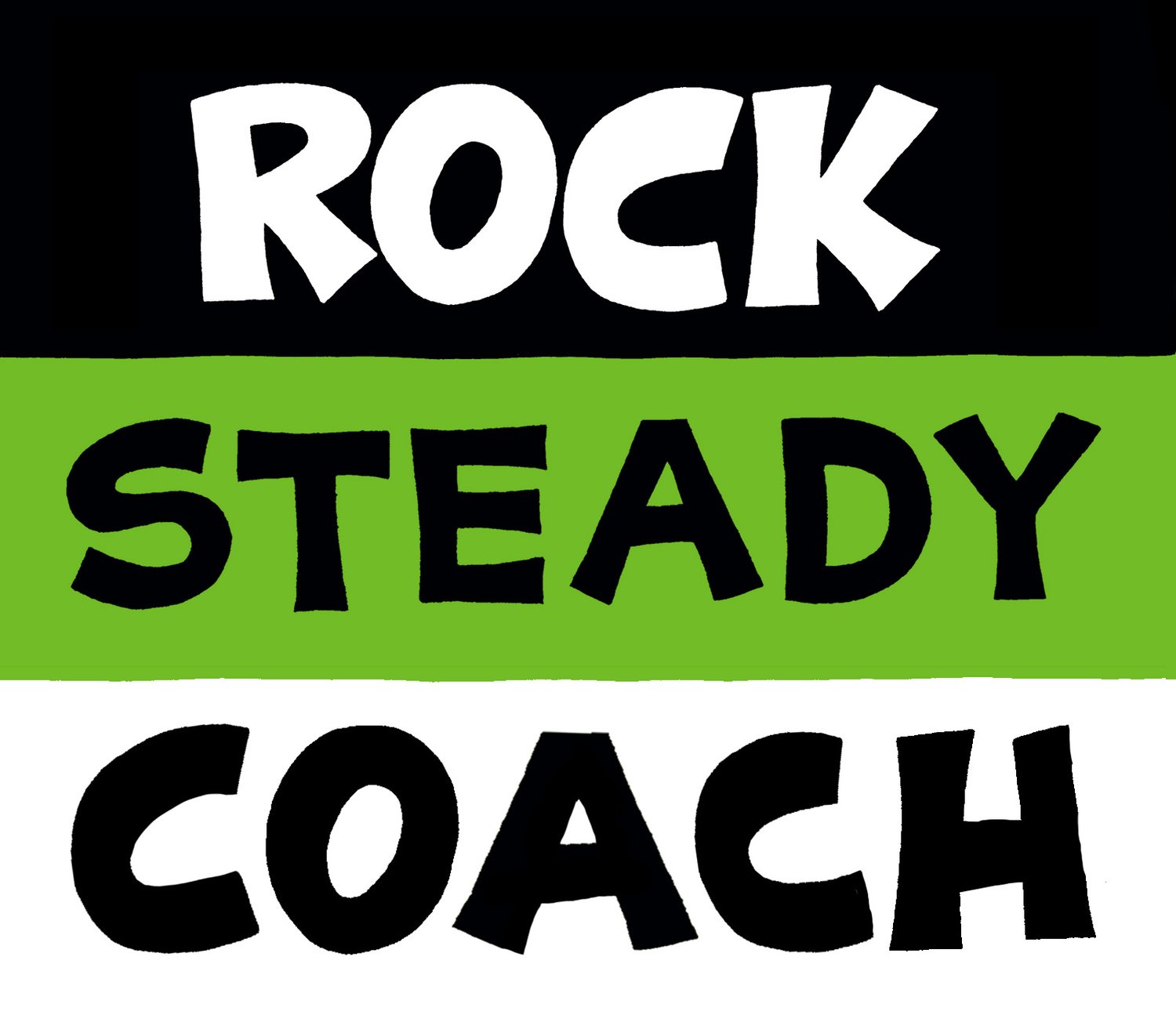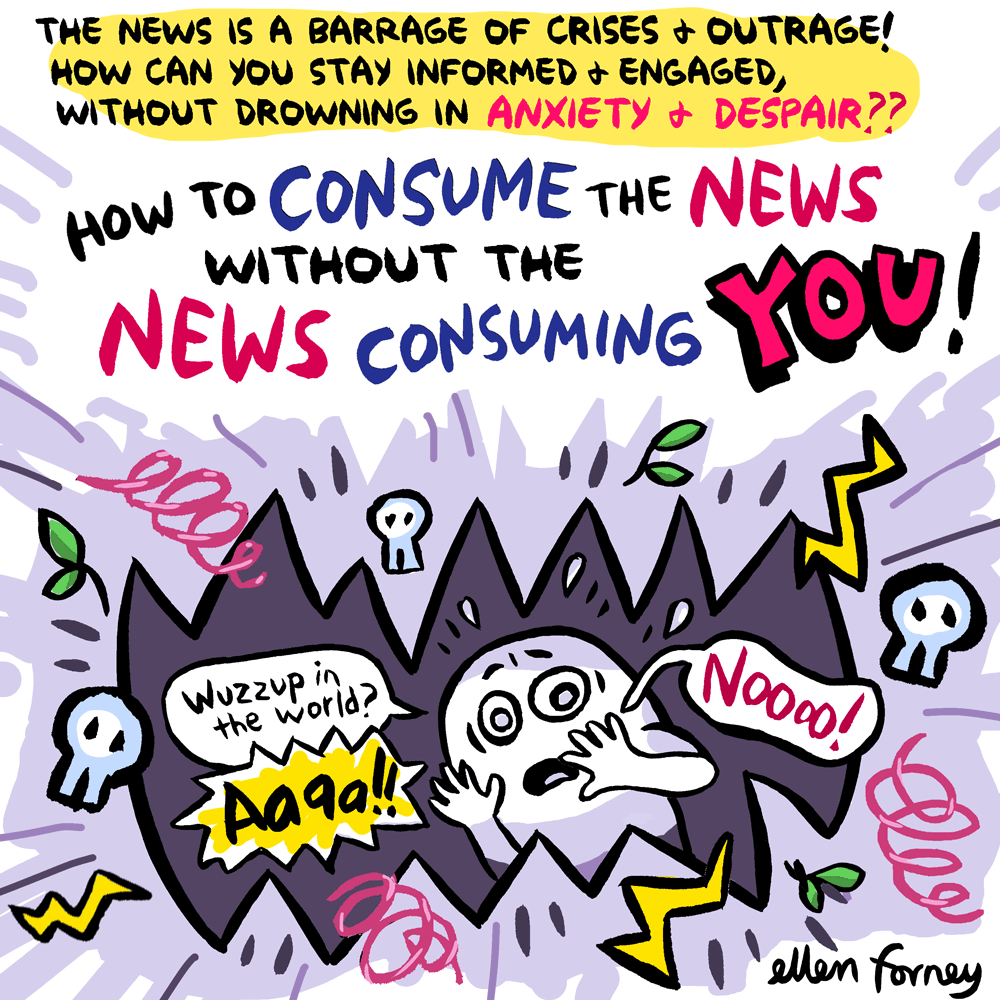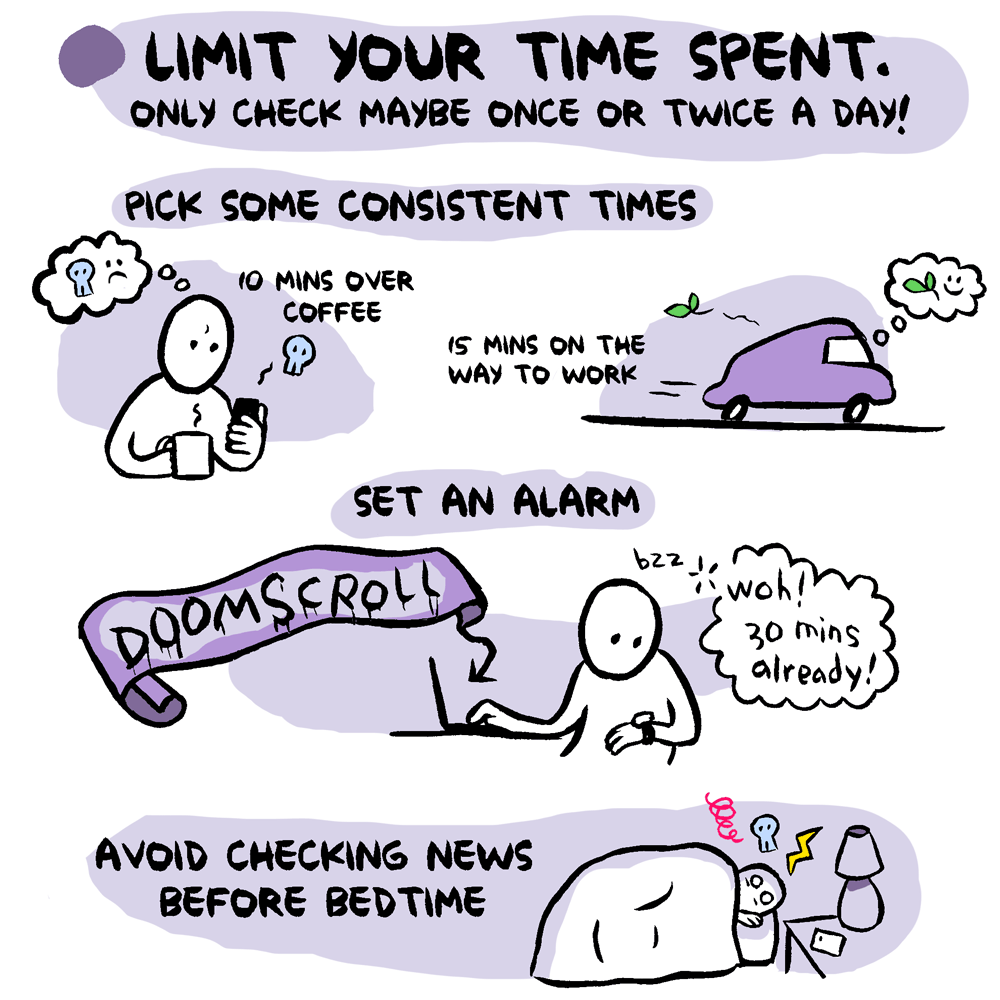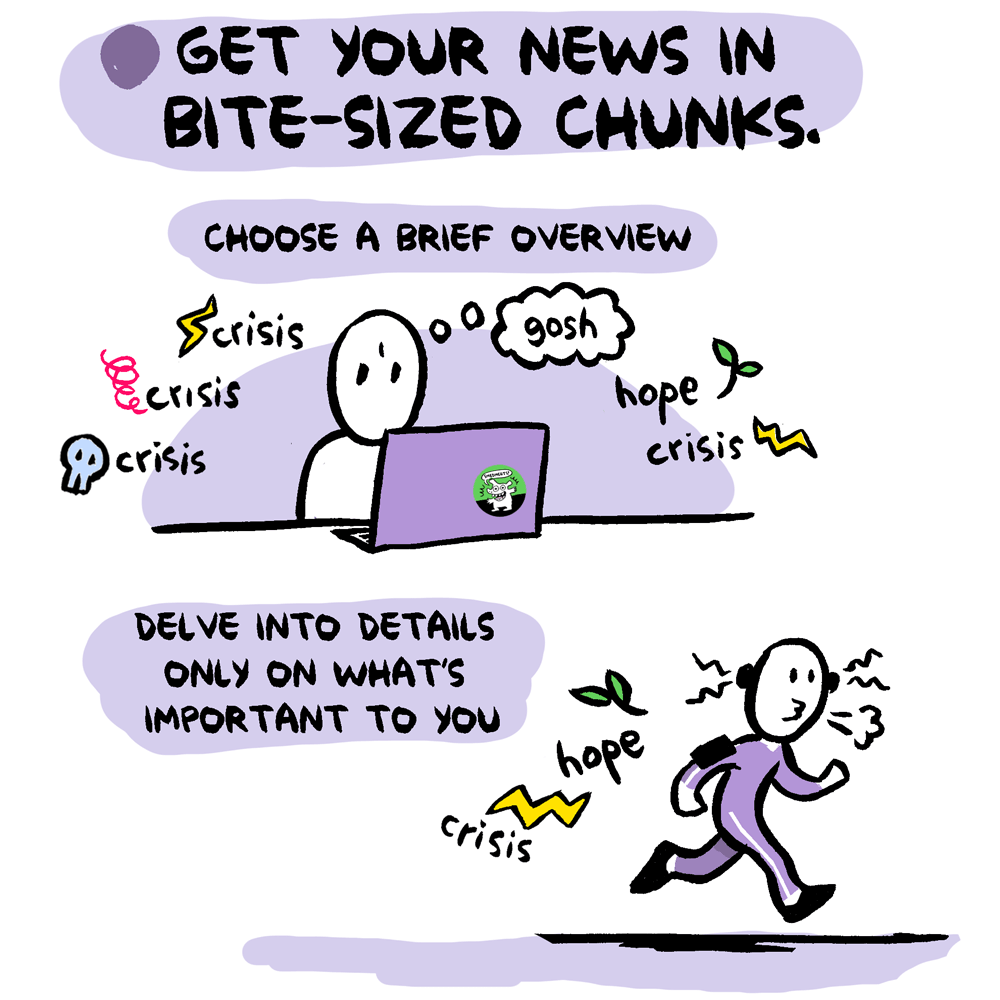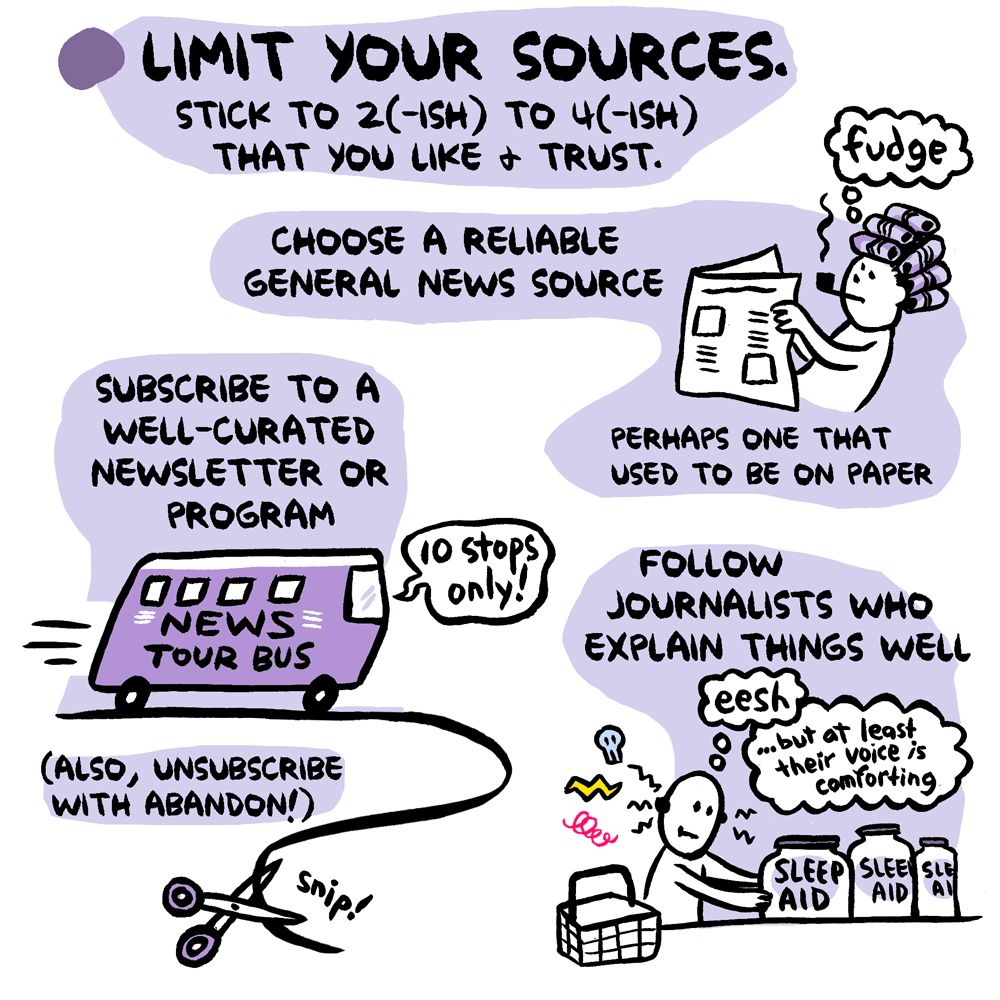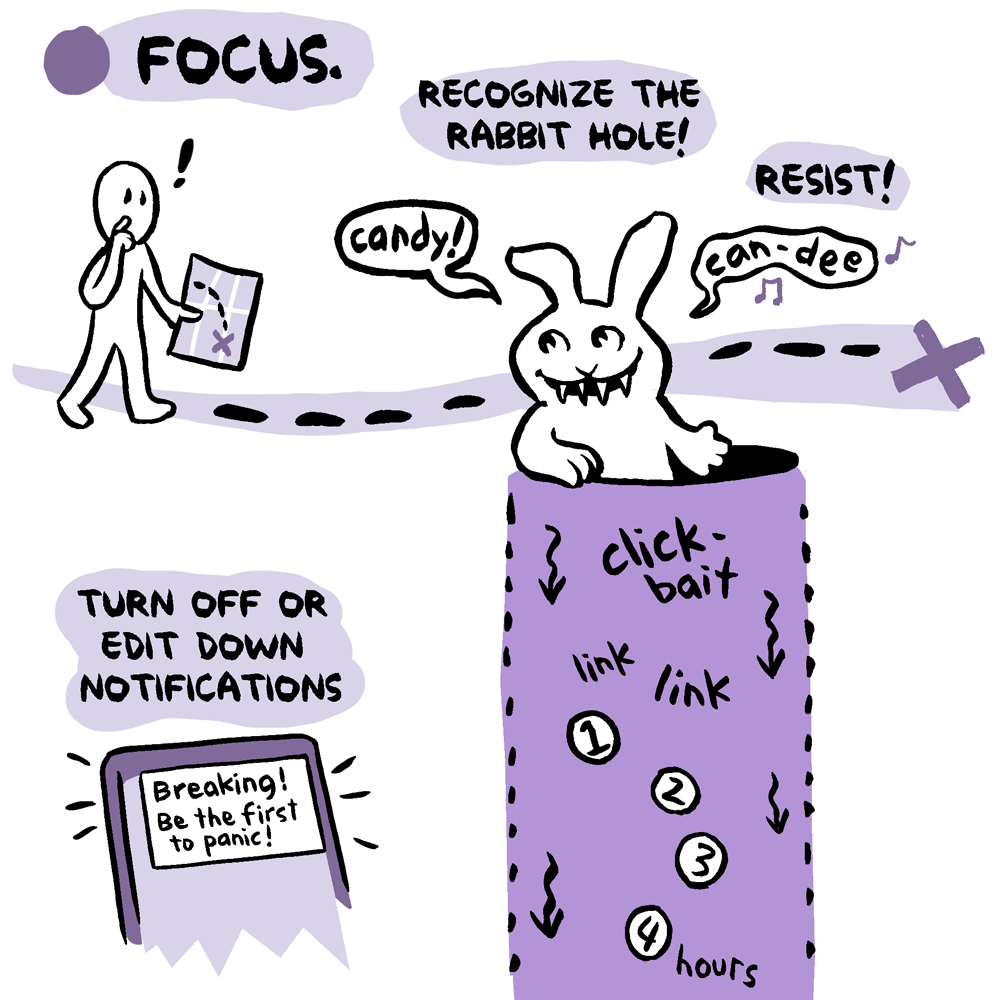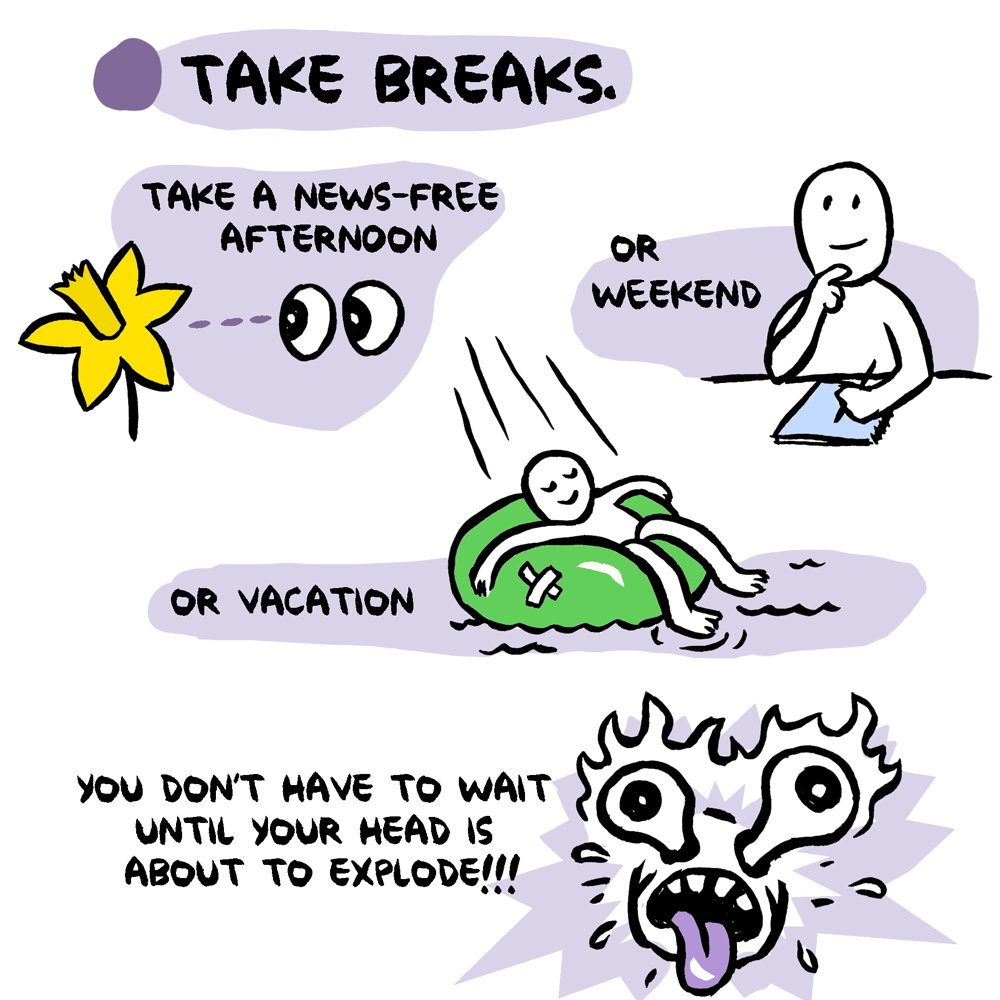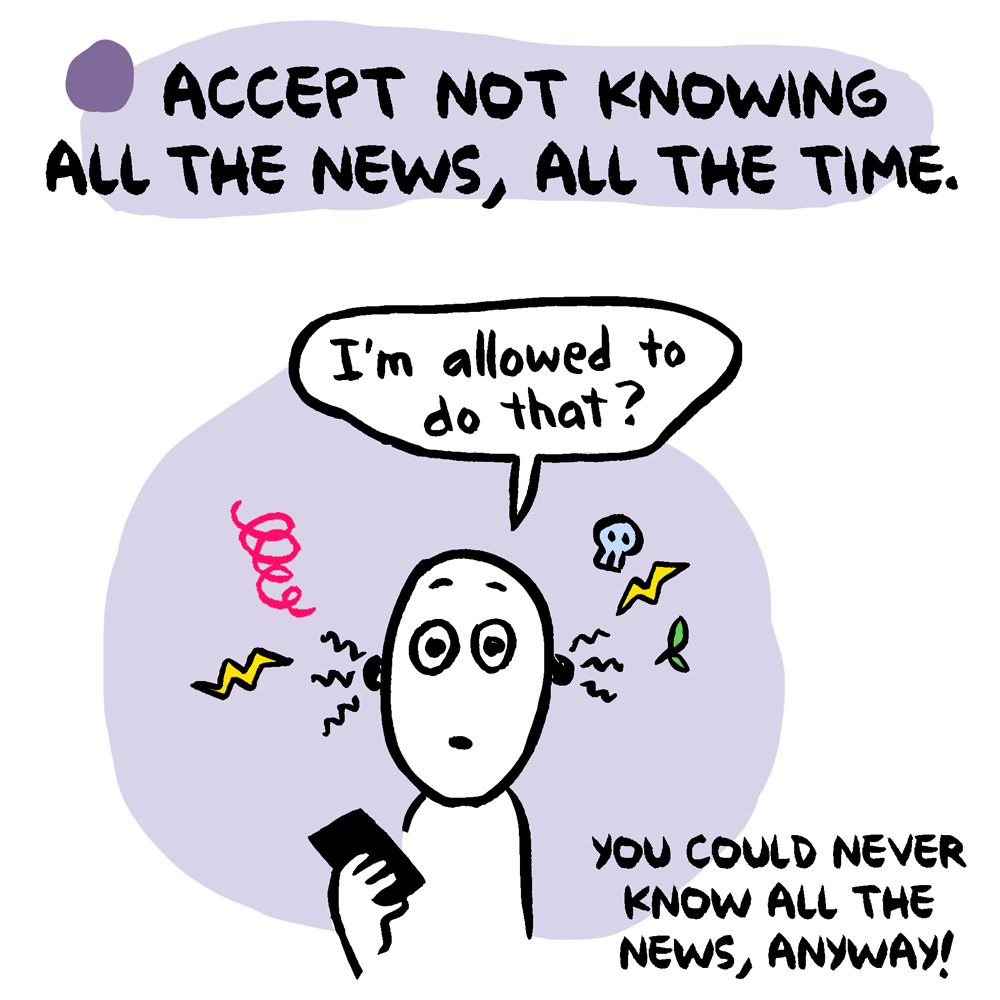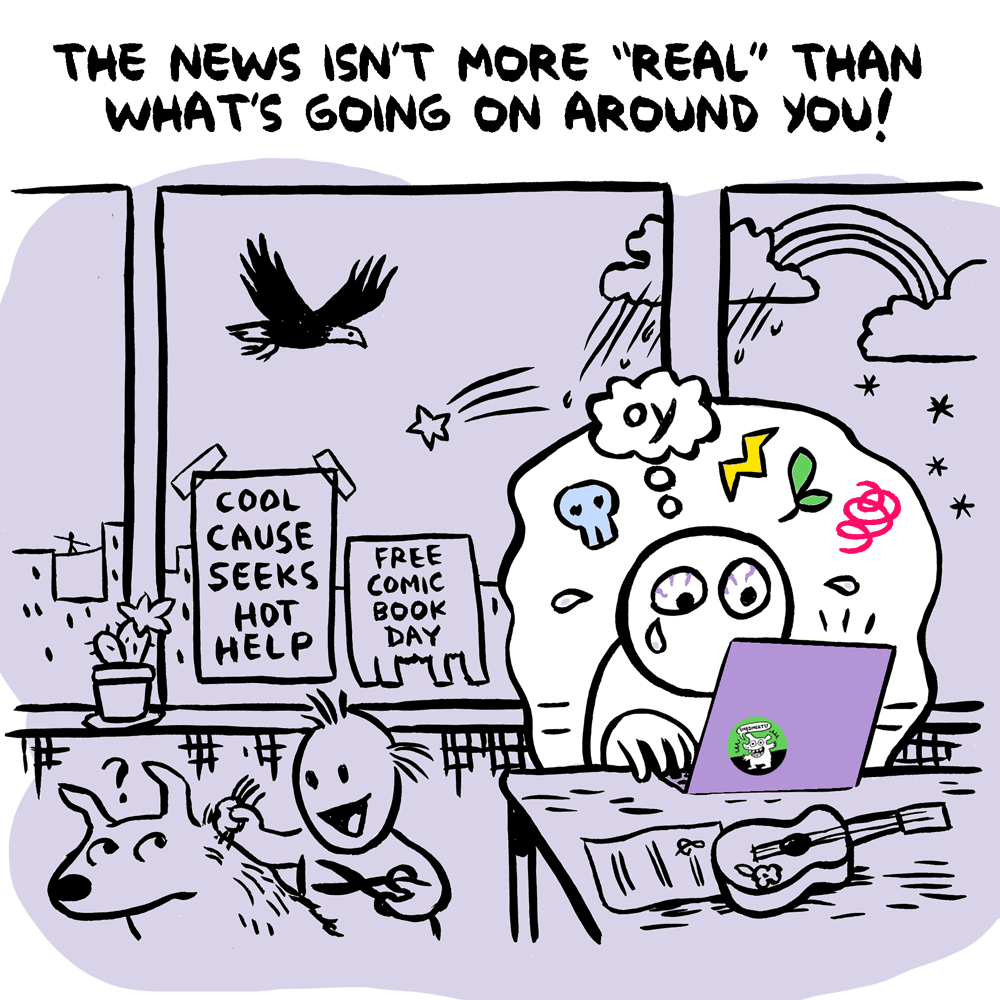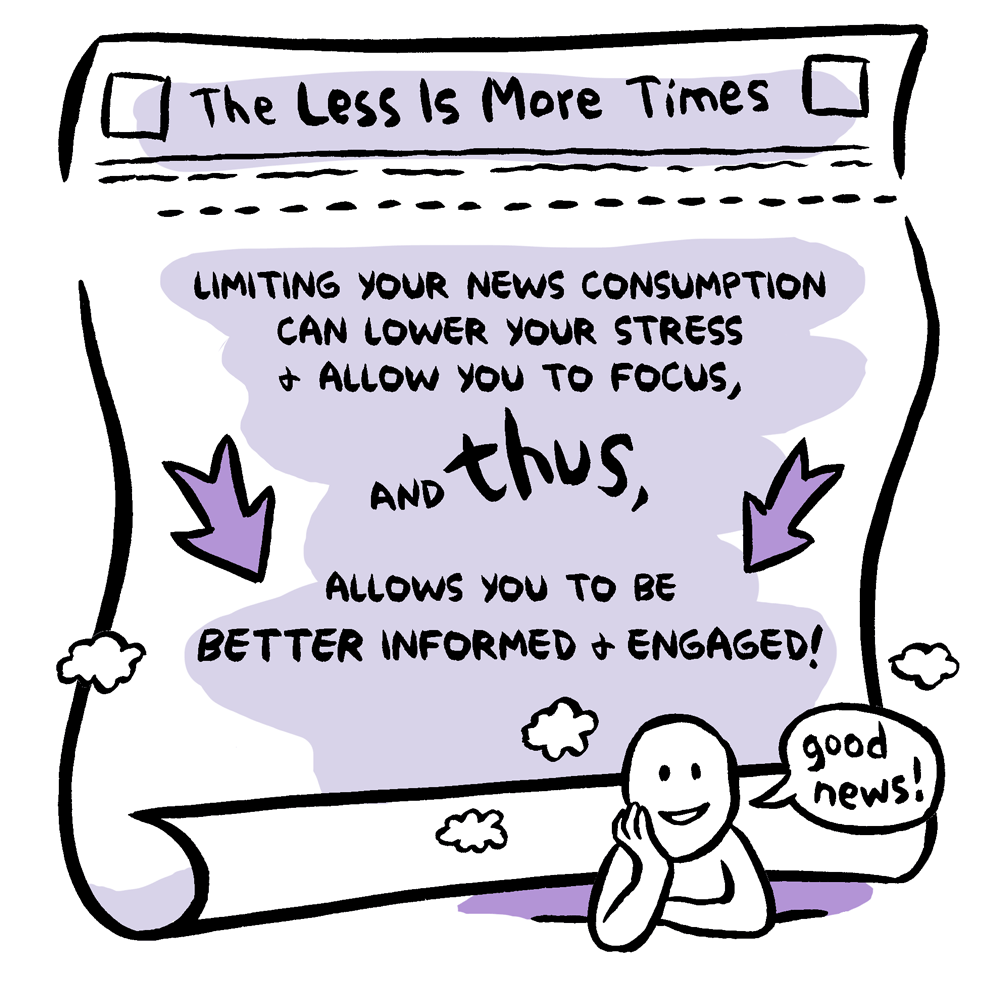The News Blues
Can you stay on top of current events without drowning in anxiety and despair? (A: Yes!)
If staying on top of the news makes you feel like like a panicky rat compulsively pressing a lever for sticky-sweet garbage, you are certainly not alone. The most common advice is to take breaks. Wise! But if we want to know what’s going on in the world, we take a break from... what? What to do?
Here are some strategies for staying in the loop, gathered from some truly inspirational research and conversations!
Find balance in bipolar.
As a mental health coach with an action-oriented program, I will help you map out and manage your own long-term stability. I was diagnosed with Bipolar 1 in 1998, and have been stable for over 20 years. You—yes, you!—can have a stable life, too. Find more information at rocksteadycoach.com
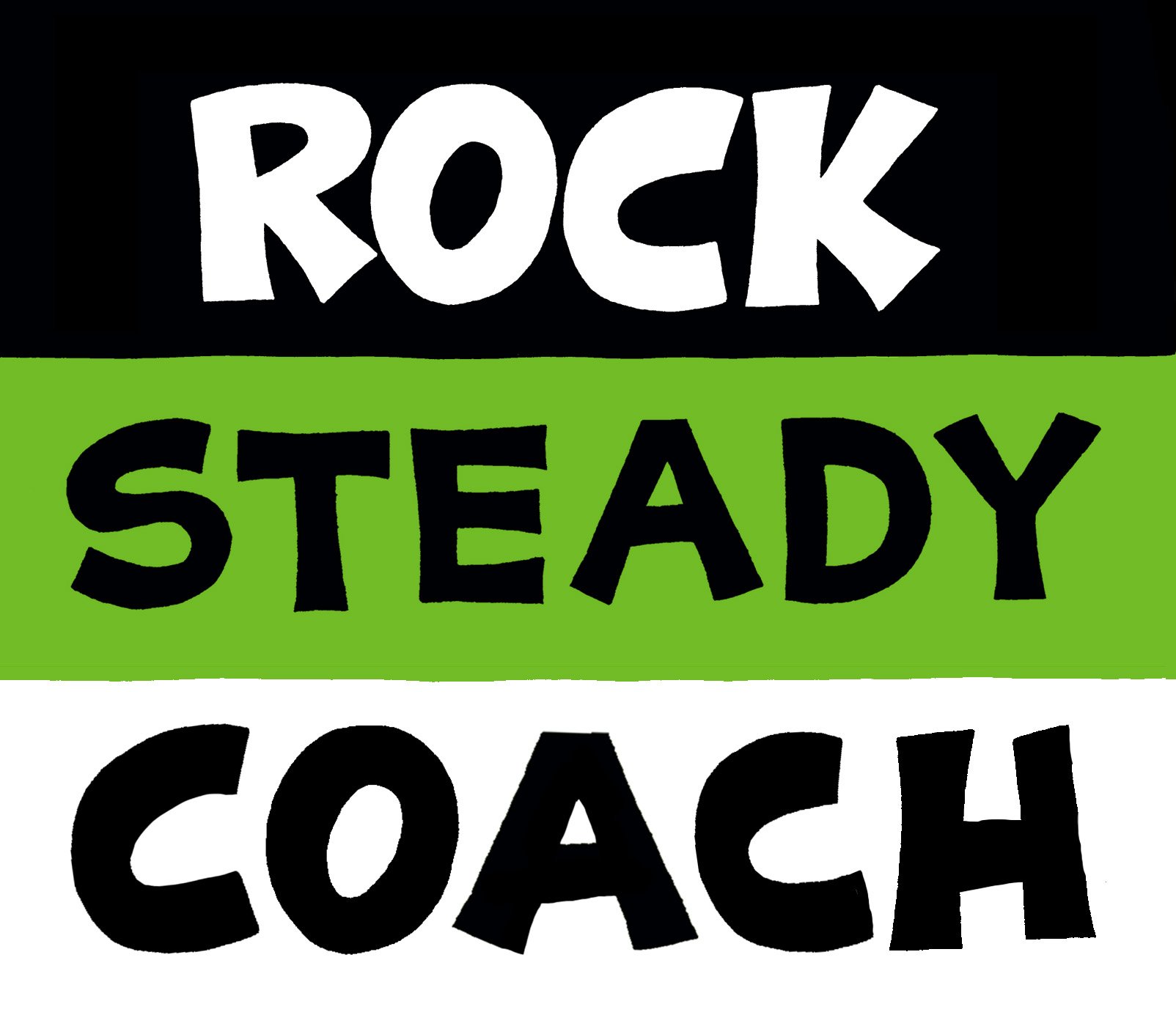

Ellen Forney is an artist, author, and mental health coach. Her work includes bestselling graphic memoir, Marbles: Mania, Depression, Michelangelo, & Me, and mental health guidebook, Rock Steady: Brilliant Advice From My Bipolar Life, selected by JAMA (Journal of the American Medical Association) as "Best Graphic Medicine of 2018.”
Her work has been published and reviewed in The Washington Post, Psychology Today, The Guardian, Bipolar Magazine, National Public Radio, and more.
More to read:
Deciding what news sources to stick to isn’t easy! I found it fruitful to poll my friends and family to find what they read or listen to. You can also check out advice on finding reliable news sources, and here’s an extensive list if you have the bandwidth.
An excellent case for limiting your intake of news: “How the news took over reality” by Oliver Burkeman, The Guardian, May 3, 2019.
A brief article about recognizing clickbait. Even respectable news sources use rabbithole-y clickbait-y headlines, and it’s helpful to keep that in mind when scanning the news.
An interesting article from NYU about constructive journalism, which focuses not on “happy” stories, but on using a nuanced and solution-based approach. Even just reading this article made my shoulders relax.
Transcript
Panel 1. The news is a barrage of crises and outrage! How can you stay informed and engaged, without drowning in anxiety and despair?? How to consume the news without the news consuming you! [Art: A character, surrounded by skulls and lightning bolts and spirals, holds up their hands protectively in fear, saying "What's up in the world? Aaaa! Nooo!"]
Panel 2. Limit your time spent. Only check maybe once or twice a day! Pick some consistent times – 10 minutes over coffee (Art: person drinking coffee); 15 minutes on the way to work [Art: a purple car]; Set an alarm [Art: person at laptop with a paper scroll above that says "DOOMSCROLL"]; Avoid checking news before bedtime ]Art: stressed-out person awake in bed]
Panel 3. Get your news in bite-sized chunks. Choose a brief overview [Art: stressed-out person with a laptop thinking, "Gosh"]; Delve into details only on what's important to you [Art: a person jogging and listening to a podcast]
Panel 4. Limit your sources. Stick to 2(-ish) to 4(-ish) that you like and trust. Choose a reliable news source, perhaps one that used to be on paper [Art: woman in large curlers smoking a pipe reads a newspaper, thinking "Fudge"]; Subscribe to a well-curated newsletter or program [Art: a small bus with "NEWS TOUR BUS" written on the side, with a word balloon saying "10 stops only!"]; Also, unsubscribe with abandon! [Art: a pair of scissors "Snip!"]; Follow journalists who explain things well [Art: person at a store, reaching for a large jar labelled "Sleep Aid", listening on headphones, thinking "Eesh... but at least their voice is comforting"]
Panel 5. Focus. Recognize the rabbit hole! Resist! [Art: a person holds a map whose path goes past a large rabbit hole, with a large rabbit saying "Candy! Can-dee"]; Turn off or edit down notifications [Art: smart phone with a notification: "Breaking! Be the first to panic!"]
Panel 6. Get support. Talk with friends who are concerned abut the same things [Art: a character says "Square peg," another character responds "Round hole"]; Talk with friends with a different perspective [Art: a third character says "Different angle"]; Make a pact with a friend to not talk about news for an evening or a day [Art: word balloons: "K?" "Totally"]; Skip the news and ask a friend for an occasional update [Art: word balloons: "Can't" "Word"]
Panel 7. Take breaks. Take a news-free afternoon [Art: eyeballs looking at a daffodil]; or weekend [Art: person thoughtfully writing in a journal]; or vacation [Art: person smiling with eyes closed, floating on water in a large inner tube]; You don't have to wait until your head is about to explode!!! [Art: a head on fire with eyeballs popping and tongue out]
Panel 8. Accept not knowing all the news, all the time. [Art: person holding phone, looking startled, says "I'm allowed to do that?"] You could never know all the news, anyway!
Panel 9. The news isn't more "real" than what's going on around you! [Art: stressed-out person with a laptop at a table, with a line around them indicating that they're in a bubble of sorts. There is a lot going on around them that they don't notice: A small child about to cut a dog's hair, a blooming cactus, a ukelele with some sheet music, a cloud with rain and rainbow and snow, a shooting star, a bald eagle flying by, and some signs for events.]
Panel 10. Limiting your news consumption can lower your stress and allow you to focus, and thus, allows you to be better informed and engaged! [Art: the text is on a scroll that look like a newspaper, titled The Less Is More Times. A smiling character says, "Good news!"]
